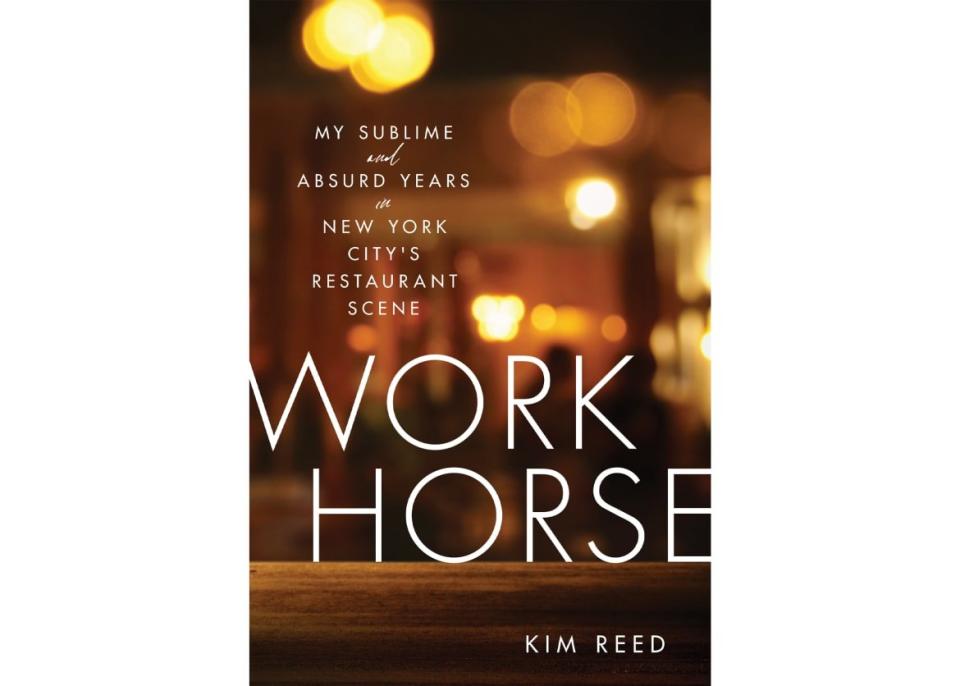What Happened When MeToo Took Down Mario Batali

In late 2017, celebrity chef Mario Batali was accused by multiple women of sexual misconduct and harassment. The allegations shook the restaurant industry and, within days, Batali was ousted from his various business ventures, including several TV shows and the lucrative restaurant group he co-owned with celebrity mother-and-son chef duo Lidia and Joe Bastianich.
The following is an excerpt of Workhorse: My Sublime and Absurd Years in New York City’s Restaurant Scene, a new book from former Bastianich executive assistant Kim Reed. The author gives a dramatic insider’s account of how the misconduct scandal played out within the Batali & Bastianich Hospitality Group.
--
“You’ll like Marcus. He’s like a less hot version of Aaron,” Joe said.
Marcus was the crisis PR rep we hired to manage communications relating to the scandal.
“Pull up that email with his invoice and send it to me. Don’t pay it yet.”
This was pretty much the extent of my discussion with Joe these days. I got all the information on the scandal from Joe’s inbox. He knew I saw everything, so we didn’t need to talk about the details. I asked him to let me know when it was okay to tell my parents what was happening. I’d worked for B&B Group in some capacity for sixteen years. This was the lens most people saw me through.
The major players in food media had a love/hate relationship with our group over the years. I’d always been defensive when stories came out. What did they say? Was it positive? Did they get it right? How much snark was in the piece? For big stories, the outlets sent Joe a list of facts to check before they went to print. As I waited for this particular email from the fact-checker, I thought about how odd it was to be rooting for them. To be one hundred percent behind them as they prepared to go to press with a story that would alter the company forever.
The email from the fact-checker hit Joe’s inbox. I scanned the list of allegations for hints of the handful of alleged incidents I’d heard so long ago when I was a hostess at Babbo. But none of the stories that had been whispered to me, warnings I’d been given, were on this list. Every single allegation was new to me. How many more were there?
Eater broke the story on my thirty-ninth birthday: Mario was accused of sexual misconduct and abusive behavior by former staff and female journalists spanning back to the late ’90s. Immediately, he was banned from entering the group’s restaurants. B&B Hospitality Group put out a statement that Mario “...will step away from the company’s operations, including the restaurants, and has already done so.”
Mario’s response included “much of the behavior described does, in fact, match up with ways I have acted. That behavior was wrong and there are no excuses.”
The same morning, Joe needed to get his passport renewed, and took me with him. I recalled checking the expiration date during my first week on the job and thinking I wouldn’t have to worry about it; I wouldn’t still be there in eight years.
I shlepped down Varick Street looking for the entrance with a visibly shaken Joe. I really didn’t need to go with him, but he insisted because he and Alice planned to take me out for a birthday lunch at Lupa, just across the neighborhood, immediately following.
While Joe waited in line, I checked on Elena to see if she was ready with the translated version of the company’s statement on the scandal, and Joe’s personal statement for the Italian press. I watched Joe pick up his phone, “Ciao, Oscar.”
Elena told me, “Eh, Kim, it will not be such big news here. In Italy, these things aren’t such a big dea… sfortunatamente.”
Elena was excited about our upcoming trip to Miami. In her world, everything was still normal. She’d worked out a spokesperson deal for Joe on a new European cruise line, and they were flying the three of us to South Beach for the kickoff.
In the following days, my workload tanked. I came in at 9:30 a.m. and left at 5:30 p.m. There were no requests for Joe to appear on The Today Show or CNBC; the only story was the story. No more special projects, dinners, music shows. It all halted. Calls and meetings with the attorneys and our crisis PR team took up most of Joe’s time. For the first time, I was not invited. Also for the first time, I didn’t want to be there. I was sure my simmering anger, which I barely kept a lid on, had something to do with it.
More stories came out. Other women shared their stories on social media. Every day I showed up angry. It’d been bubbling up since the Harvey Weinstein scandal broke back in October. That was around the time I’d gotten wind of a complaint against Mario by an employee at one of the restaurants. I saw the notice come into Joe’s inbox, but when I went back to read through it later in the day, it had vanished. I wondered how bad it could be, if I wasn’t allowed to see it. I thought I saw everything.
I tried to get rid of my anger. I reminded myself that I had a plan for what was next for me. But some days, what I felt was pure rage. I was angry for the women—who I believed completely. I was angry for a lifetime of little things that all of a sudden we were allowed to talk about.
When my father called immediately after my text, I knew what he was going to ask.
My throat constricted. I answered the phone.
“Oh my God, Kim. This sounds awful. It sounds like... is Mario really a bad guy?” The disbelief, the shock in his voice made him sound almost childlike as he tried to reconcile the situation.
I filled my parents in on the basics of what they could expect to see in the press. I hated that I needed to have this discussion with them. Then I thought about the call I didn’t have to make. The calls the women had to make to their parents, their family members, their friends and coworkers. How did those conversations go? How gut-wrenching was it to make those calls? They had mothers and fathers too. Those women were someone’s kids. Someone’s sister. Someone’s mother.
Aside from a comment I made to my parents during their last visit, I never let on that Mario had a bad reputation.
“When you next see Mario,” my mother had said back then, “be sure to tell him how much we’re still enjoying the places. He’s not around when you go to the restaurants after work?”
“No, not really. I don’t drink with him. People have always said he’s a mean drunk. Crude.”
“Really?” said my dad, saucer-eyed.
“You never told us that!” whispered my mother.
“Well, I’m telling you now.”
Back in the waiting room of the New York Passport Agency, I sighed. “A lot is happening here, Dad. I have to go—”
“Wait now... he didn’t... did he ever...”
“No, Dad—he never touched me. I’ve barely seen him these last eight years. I’m sorry. I really do have to go. I’m sorry I have to tell you guys this.”
“We’re just glad you’re okay,” my mother chimed in from the background.
Aside from a handful of what I’d consider inappropriate comments scattered over the years, Mario really didn’t bother me.
“Hee hee—here comes Joe’s other wife,” he’d yelled across the room at the opening of Eataly Downtown. “Hee hee, go fuck yourself,” I said—only in my head, of course. I wouldn’t dare.
All Joe kept saying over the next few days was, “Jesus Christ. I can’t believe this,” over and over again. “This is a nightmare.”
Joe asked me to put up a sign in the Corporate elevators listing his cell phone number and inviting staff to call him directly if they were upset and wanted to talk. I appreciated the gesture but pitied the fool who dialed that number. Joe was not a nurturer. He’d been going around to all the restaurants to talk to the staff.
This was the kind of thing I generally orchestrated, but I stayed out of it. I was glad not to see it. I wished I could be a source of support for people, or just help manage this situation so it went as smoothly as possible for everyone, but I was lucky if I didn’t start crying at my desk—or yelling. The urge to yell at almost everyone I spoke with was something I was actively managing.
Joe was heavily criticized in the media. Eater reported that he helped create a “boys’ club culture” within the B&B Group and could not corral Mario’s behavior.
I had never thought about that until I read through the story. I shut my laptop and thought, That sounds about right. If someone had asked me years ago if I worked in an oppressive, boys’ club environment, I probably would’ve answered no and meant it. Scanning through the article made me realize that not everyone had fun working for Joe, and it seemed I’d had a wildly different experience than what some of my coworkers were reporting.
Joe told the press that he had “heard [Batali] say inappropriate things” to employees and that he “should have done more” to criticize Mario. He said, “I’m proud of what our teams accomplish every day, and I’ve always tried to show respect for them and their work.” He said in a statement, “It pains me that some employees feel differently, and I’m reexamining my own behavior to ensure that everyone I work with feels that respect.”
I was good at being a social worker. Helping people came easy. To sit with someone else’s emotions—often raw or volatile emotions—in a professional capacity, when the situation had nothing to do with me, came easy. I always knew what to say or when not to speak and just listen, how to garner trust and put them at ease. Sometimes the most vulnerable just needed to know that there was someone out there who cared. No one’s problems could be solved in one hour, but my clients trusted that I would do what I could to help them. That we were in this together.
I didn’t know what happened to Mr. Stein. He was so vulnerable. I was one of a handful of people with whom he came into physical contact at the end of his life, and I didn’t even know what happened to him.
The last I remembered was that his daughter flew in from Nevada when Mr. Stein started to deteriorate fast. She called me before flying out. For the first few minutes, she was stoic, like her dad. Then she broke down.
“I’m an alcoholic,” she said. “I haven’t had a drink in ten years . . . but this is the kind of thing that...”

Excerpted from Workhorse: My Sublime and Absurd Years in New York City’s Restaurant Scene by Kim Reed. © 2021. Available from Hachette Books, an imprint of Hachette Book Group, Inc.
Get our top stories in your inbox every day. Sign up now!
Daily Beast Membership: Beast Inside goes deeper on the stories that matter to you. Learn more.

